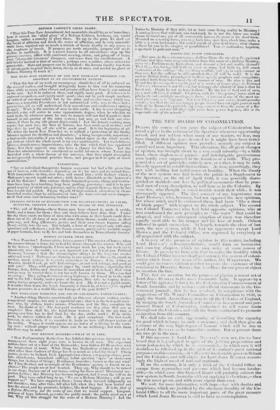TIIE NEW BOARD OF COLONIZATION.
DurZING the e01.11Se Or ten years the subject of Colonization has found a 1)1 cc ill tile CO1111111E4 a tile S1tiTh/10/' whenever opportunity served, and not seldom whet) many of our readers, we fear, may have thought that the spaeo devoted to it might have been better filled. A different opinion now prevails; scarcely any subject is consith..red more important. This alteration, like all great changes of opinion, was brought about by a \a' 3' SHIA. minority—by a little baud, wluise singleness of purpos, and indefatigable perseverance were hardly ever surpassed in the f,ttnilers /I They pro- pounded a set of' principles entirely new, or rather, it may be said, directly opposed to established notions. At first, accordingly, they met With nothing but indilference or hostility. When the theory of the new system cycle laid beibre the public in a Supplement to the Spectator, on the 3d of April 1830, it WaS generally disre- garded or derided—not less by political than by prae-
economists tical men of every description, as Weil here ill ill tile Colonies. By
some ti.w, will) thought mull trouble worth their whih., it was strenuously opposed. The first convcrt of any importance WAS Lord II„Nric,; who; hitvcv&h„d 11,11., opposed the new OphliOUS, but whose mind, until he embraced them, had been " like a sheet of blank paper" with respect to the whole subject. The second NVIIS Colonel TORRENS ; W110 ILO held opposite opinions, who at first condemned the new principles 1lS " tile WOrSt " that could be adopted, and whose subsequent adoption of them was therefore equally credi able to his temper atel his love of truth. Others fbIlowed in quick succession. At length, towards the close of last year, the new s:.-,:tent, while it had no opponents except Lord llowtel: and the Colonial Office, was espintscd by everybody at all acquainted with the subject. A Itiottiry of the progress or opinion in this matter, hicluding Lord lit ice hei 1(111N, W01111 limn an instructive and amusing chapter, which we may write at SOIlle SellS011 of leisure. Ai present We have only time to tiotiee the hostility which the Colohi,d 011(12 hasevor displayud toward:: ti c system of coloni- zation which bears the name of its author, :Or. 'WAKEFIELD. We could give instances without number to prove the existence of this sentimcht in Downing Street ; but it suffices for our present object to mention the fitet.
This fact we locution for the purpthie of placing a recent act of Lord Jon N It ssul.i, in the ino,.1 fitvourahle light. It appears by a letter (Allis (printed below) to the Colonization Commissioners of South Australia, and by various semi-ellicial statements in the Go- vernment journals, that he has resolved, in compliance with the suggestims Air. W.tao's C'ommittee on Colonization in I 836, to apply the ;intuit A ustrilian sy.-dent to all tin' Colonies of England, by mergiug du: South Australian (hqtnnission in a general and per- manent koard Colonization, ti sell waste lands throughout the ('oloilics, and wit h the funds ).z.) obtained to promote emigration from this country.
We shall take an early opportunity of describing the capacity for good which belong,: 10 such a nteasure ; and shall then give an estimate of the very high degree of honour which will be due to Lord JOHN Iiissm.t. as its immediate author. But at present there Etre two ifv in the case.
It' this measure is Lord .1(o;' llessEm:s own act, (as we have heard that it is,) adopted in sp;(! of the johhing pmpensities and mean jealousies by which he ,errounded,--in which eme it will doubtless be Ibllov,All up in thy .pirit of its authoes great national
purposes on this cceasion,--it nu t'(.1 incalculable gt otti till Britain
and the Colonies, and will ohtai. Ltml .101IN ll.1.1.ELL accord- ingly the highest inced of nal iet!:11 9-.ratitude.
If, on the contrary, it is only a trick. of the Colonial Office to escape from reproaches and pre,,stire Which had beCOIlle intoler- able,—in which case this General Board will probably subvert the new system in South Australia without applying it clsewhere,—then the war must go on, and with more vigour than ever.
We wait for more information, with hope—but with doubts and suspicions, which are justified by the obstinate hostility of the Co- lonial Office to all the more important parts of' the great measure which Lord JOHN RUSSFI.L is said to have in contemplation.
































 Previous page
Previous page